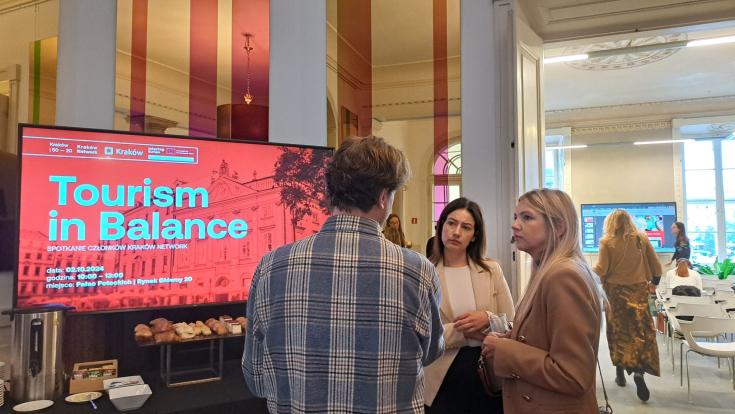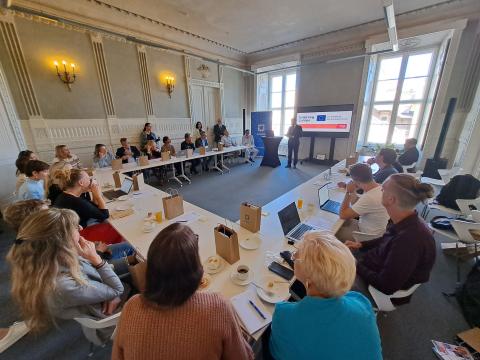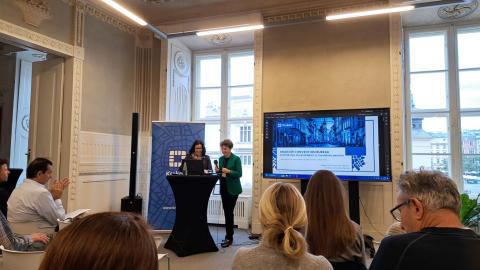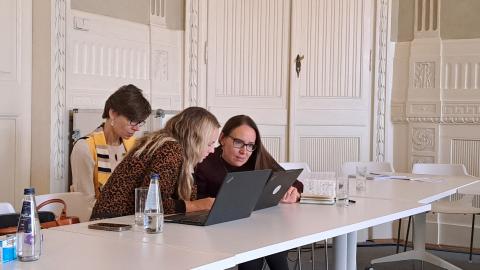Kraków Partner Meeting: 3 Days of Collaboration & Learning
Day 1: Setting the Tone with Krakow’s Heritage and Sustainable Vision
The first day of the meeting began with an inspiring walking tour of Kraków’s Old Town, providing a historical backdrop to the sessions ahead. Against this culturally rich setting, the group delved into pressing discussions around sustainable tourism and urban life balance.
Key presentations included:
- Natalia Kulec-Greń unveiling Krakow’s Sustainable Tourism Policy (2021-2028), a strategic initiative designed to safeguard the city's cultural heritage while fostering responsible tourism practices.
- Robert Pawlusiński, Michał Janaś and Jacek Jordan explored topics including short-term rentals, the "Respect Krakow" initiative, and the city's night-time economy, emphasising the need to balance tourism demands with local needs.
- Anouschka Trauschke led a hands-on workshop, engaging participants in discussions about tourist behaviour and how it can coexist with the rhythms of everyday life.
The day concluded with a tour of three districts undergoing exciting transformations—Kazimierz, Zabłocie, and Wesoła—offering insights into the city’s innovative urban development projects.
Day 2: Synergies Between Tourism, Residents and Visitors
Building on the momentum of the first day, the second day’s sessions focused on crafting tailor-made solutions to improve tourism management while fostering stronger connections between local communities, visitors, and industry professionals.
Key highlights included:
- Małgorzata Przygórska-Skowron from the Kraków Convention Bureau discussed the role of the Kraków Network in fostering synergy between tourism, residents, and visitors.
- Krzysztof Paradowski introduced the Kraków Network initiative, which aims to attract and boost business events in the city, highlighting the importance of business tourism to Krakow’s economy.
- Hele Lõhmus from Visit Tallinn presented Estonia’s sustainability certification model, offering a blueprint for other cities seeking to implement responsible tourism practices.
In the afternoon, presentations from Amsterdam and Małopolska sparked lively debates on destination marketing and new tourism models:
- Rene van Schie shared Amsterdam’s data-driven Holiday Rental Registration System.
- Dorian Lungu and Oana Coanta introduced unique gastronomic initiatives from Romania, showcasing the role of local cuisine in enhancing the visitor experience.
The day wrapped up with a walking tour, featuring Krakow’s innovative civic budget projects and new tourism products like Krakowianki, providing practical examples of how local initiatives can enrich the tourism landscape.
Day 3: Reflecting, Collaborating, and Planning for the Future
The final day of the meeting was dedicated to reflection and future planning, starting with an enlightening presentation on the Green Key Certification at the Mercure Kraków Stare Miasto Hotel. This certification underscores the importance of sustainable practices in the hospitality sector.
Key sessions included:
- A reflective session on Tallinn’s sustainability journey, led by Simone Moretti, where participants used interactive post-it sessions to share their key takeaways and map out future steps.
- Country Group Reflections, moderated by Rami Isaac, allowed participants to identify actionable strategies and areas for improvement, ensuring that the lessons from Kraków would be applied back home.
The meeting concluded with a plenary session, where all groups presented their reflections and next steps, followed by an ISG project management meeting led by Dr. Eugenio Van Maanen, outlining future collaboration goals.
Looking Ahead: Implementing the lessons learned
The Interregional Partner Meeting in Kraków was very successful, fostering meaningful exchanges on sustainable tourism and urban development. Participants left with knowledge, actionable strategies, and a renewed commitment to promoting responsible tourism that benefits visitors and local communities.



